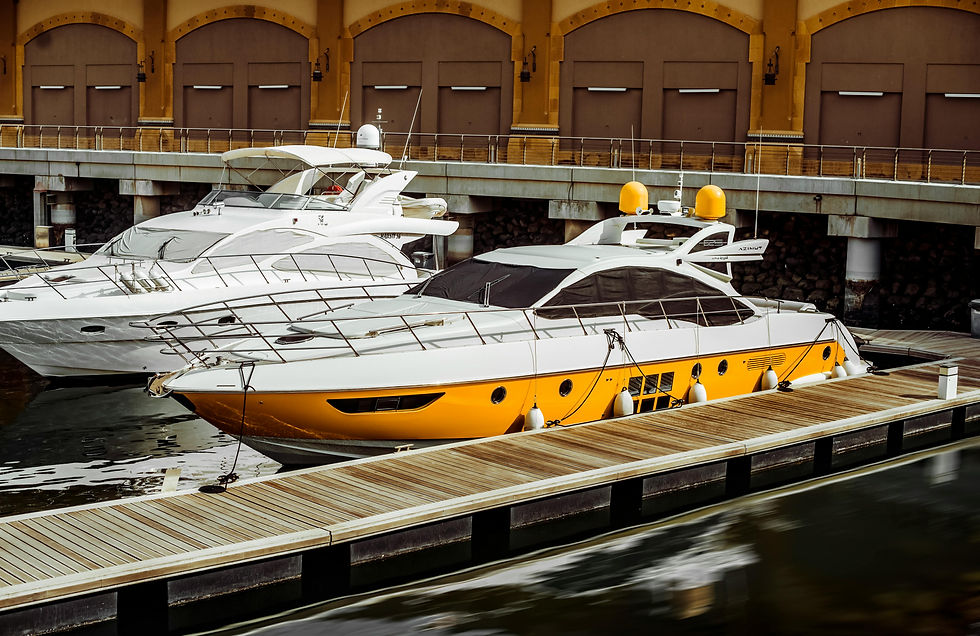Buying a Second-Hand Yacht or Boat: What You Must Know
- Merve Aydemir
- Jun 25
- 3 min read
Purchasing a second-hand yacht or boat can be an exciting and financially smart decision — especially for those who want to enjoy the freedom of the open water without paying the full price of a brand-new vessel. However, this kind of investment comes with serious responsibilities. A poorly chosen boat could lead to endless repairs, financial loss, and even safety hazards at sea.
This guide walks you through everything you need to consider before purchasing a used boat or yacht, with a special focus on practical tips, legal steps, and technical inspections.

1. Define Your Purpose Clearly
Before diving into the market, ask yourself: Why am I buying a boat?
Are you planning to use it for weekend leisure trips, long-distance cruising, fishing, or maybe even charter business? Will it be for private use only, or do you intend to rent it out? These questions are not trivial. The size, type, and features of your boat will vary drastically based on its primary use.
Example: A day cruiser with an outboard engine might be perfect for weekend outings, while a blue-water sailing yacht would be necessary for long voyages.
2. Check Ownership and Documentation
One of the most common mistakes buyers make is skipping a thorough background check on the boat’s legal status. Always ensure:
The boat has a valid registration and a clear title
There are no outstanding loans or liens
All previous ownership records are accessible
The boat complies with local maritime safety standards
A Bill of Sale is issued and signed by both parties
If you're buying from the EU, confirm it has a valid CE Certificate
🚨 Avoid any vessel with unclear ownership or incomplete documentation. These could lead to legal complications or even seizure.
3. Hire a Marine Surveyor for a Full Inspection
Just like a second-hand car needs inspection, a used boat should never be purchased without a professional marine survey.
A certified surveyor will examine:

Hull integrity (check for osmosis, cracks, or corrosion)
Engine condition, hours logged, and servicing history
Electrical and plumbing systems
Steering, rigging, and anchoring systems
Bilge and keel status
Electronics (radar, GPS, VHF, autopilot, etc.)
A detailed report from the surveyor will help you make an informed decision and provide leverage for negotiation.
4. Don’t Underestimate the Age Factor
While age doesn’t always mean poor condition, it does mean increased maintenance and lower resale value. Boats over 10 years old require more frequent and costly repairs, especially on the engine and structural components.
Also consider the availability of replacement parts. Some older or discontinued brands may make future maintenance difficult or expensive.
5. Market Research and Pricing
Research similar models on the market to understand realistic pricing ranges. The price of a second-hand yacht is influenced by:
Year and brand
Engine hours
Condition of the interior and hull
Recent upgrades or overhauls
Navigation and safety equipment onboard
Never rely solely on a seller’s word — always cross-check prices on platforms like YachtWorld, BoatTrader, or local classified sites.
6. Insurance and After-Sale Support

Once you narrow down your choice, check if the vessel has an active insurance policy. Some insurance companies offer lower premiums for boats that have recent survey reports and are in good condition.
After-sale support is also crucial, especially if you're buying from a broker or dealer. Reputable sellers offer a limited warranty period or technical assistance, even for second-hand vessels.
7. Sea Trial is Non-Negotiable
Before finalizing the deal, always request a sea trial — the equivalent of a test drive for boats. This is where you can assess:
Acceleration and turning
Handling under wind or waves
Engine responsiveness and noise levels
Comfort while underway
Steering feedback and gear transitions
💡 Take notes during the trial and compare them with the surveyor’s technical feedback.
8. Buy From a Trustworthy Source
Whether it’s a private owner, a yacht broker, or a dealership, the credibility of the seller makes a big difference. Look for:

Transparent communication
Verified reviews or past clients
Willingness to share all documents
Physical presence (not just an online ad)
For peace of mind, consider certified dealers or marine consultancies like Vision Marine, which specialize in yacht inspection and after-sales consultancy.
Buying a second-hand yacht can offer tremendous value, but only if approached with diligence and awareness. A beautiful vessel may look perfect on the surface, yet hide costly problems underneath.
With careful research, the right professionals, and a clear understanding of your own needs, you can make a confident, long-term investment and enjoy the freedom of the sea without unpleasant surprises.

Still unsure which second-hand yacht suits you best?
At Vision Marine, we offer independent yacht inspection, valuation, and purchase consultancy services tailored to your needs. Whether you're a first-time buyer or looking to upgrade, we’ll guide you every step of the way.
Your next voyage starts with the right decision. Trust the experts at Vision Marine. 🌊




Comments